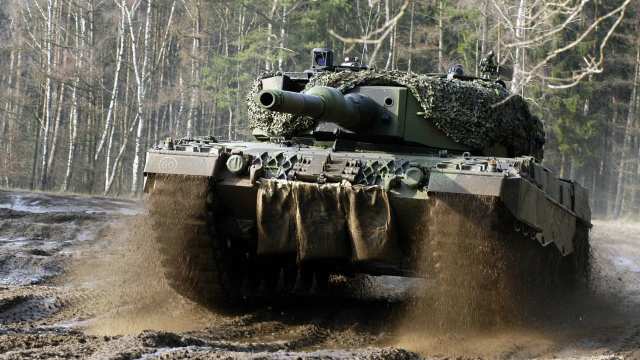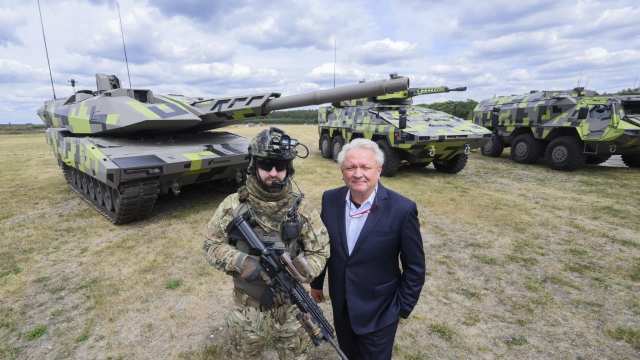The German edition of Bild am Sonntag, under the heading "Wir können 2023 keine Leopard-Panzer liefern" ("We cannot deliver Leopard tanks in 2023"), published an interesting interview with Armin Papperger, chairman of the German Rheinmetall AG group, about the details of possible deliveries of Rheinmetall weapons and military equipment to Ukraine.

Leopard 2A4 (c) Rheinmetall Main Tank His company benefits from Putin's aggressive war and must supply what will provoke a "change of epochs" [Zeitenwende - a reference to the speech of German Chancellor Olaf Scholz on February 27, 2022]: Armin Papperger (59 years old), head of the German arms giant Rheinmetall.
The group's sales in 2022 amounted to 6.4 billion euros with a strong upward trend. Ukraine, in particular, hopes to receive a line of Papperger tanks (such as Marder and Leopard) in the coming weeks. [...]
"Bild am Sonntag": Mr. Papperger, how many Marder infantry fighting vehicles are left in your yard that can be delivered to Ukraine?Armin Papperger:
Until recently, we had [in storage] a total of about 140 Marder. 40 of them were intended for Greece, since Athens handed over Soviet-designed infantry fighting vehicles to Ukraine. The first batch of 20 Marders has already been completely repaired and most of them have been delivered to Athens. Now the next 20 are at the final stage of work in our workshops.
How long does it take to repair Marder?Papperger:
We have been working on each of the 40 Marder for Greece for six months. The remaining 100 cars are in the worst condition, so they take about seven to eight months.
How quickly can they be delivered to Ukraine if Greece refuses?Papperger: Of course, we could transfer the remaining 20 Marder planned for Greece to Ukraine in a timely manner.
Other machines will follow in April, because we are working under high pressure conditions.
The fastest way: The Bundeswehr gives Ukraine its Marder, and then you fill the gap with your repaired infantry fighting vehicles.
Papperger: Maybe. But only the federal government [of Germany] can make such a decision. We are ready. But so far the government has not told us where the 40 Marder promised to Ukraine will come from.
Ukraine also really needs the main Leopard tanks. How many of them can you put?Papperger: We still have 22 Leopard 2 cars that we could prepare for operation and deliver to Ukraine.
We also have about 88 Leopard 1 [Leopard 1A5] cars left. But we cannot repair these tanks without a contract, as the costs for this amount to several hundred million euros. Rheinmetall cannot finance this upfront.
How long will it take to restore Leopard tanks?
Papperger: Less than a year. The machines are not only repainted, but also re-equipped for use in the war. They are completely disassembled and then restored. This means that even if it is decided tomorrow that we can send our Leopard tanks to Kiev, the delivery will take place at the beginning of next year.
Can Leopard tanks really help Ukraine win the war?Papperger: The Leopard main tank is extremely valuable for attacking and occupying territory.
With tanks, the army can break through the enemy's defense line and put an end to a long positional war. With Leopard tanks, soldiers can advance tens of kilometers at a time.
Ukraine is running out of [35 mm] ammunition for the German anti-aircraft self-propelled gun Gepard. When can you deliver them?Papperger:
We will finish production of the first batch of ammunition in June/July. By the middle of next year, we will deliver 300 thousand shots to Ukraine. This is a lot, so let's hope that the Ukrainian problem of ammunition for the Gepard ZSU will be solved.
The government is investing 100 billion euros in the modernization of the Bundeswehr. But arms purchases are slowly just beginning. Are politics, the armed forces, or industry too slow?Papperger: Critics oversimplify the task.
We do not have martial law in Germany, so it is necessary to observe the usual cycles of concluding arms contracts. We cooperate very well with the Bundeswehr procurement department, with the Federal Chancellor, as well as with the Ministry of Defense. So far, things are going well with a package of 100 billion euros. In the first quarter of this year, we will complete negotiations on ground equipment for the Bundeswehr, in particular, on an armored personnel carrier [Boxer] with reinforced weapons and an airborne platform [Caracal].
Have you hired new employees after the outbreak of the war in Ukraine?Papperger: 1200 men and women.
Rheinmetall's sales are growing rapidly. Are you profiting from the war?Papperger: The term is completely wrong.
We supply equipment to protect our country and our NATO allies. We are crisis employees, not profiteers in the war [literally: Wir sind Krisenhelfer, keine Kriegsgewinnler; "Krisenhelfer" is roughly analogous to "emergency worker"].
But you personally also benefit from a record stock price and increased sales along with your salary.Papperger:
Rheinmetall management has targets. But if the targets are met, then there will be no higher salary increase. Therefore, neither I nor my employees benefit from the war in Ukraine.

Chairman of the German Rheinmetall group Armin Papperger against the background of his company's promising military equipment (from left to right): Panther KF51 tank, Boxer armored personnel carrier with Lance combat module, and an upgraded Fuchs armored personnel carrier with an increased height of the landing compartment (c) DPA
